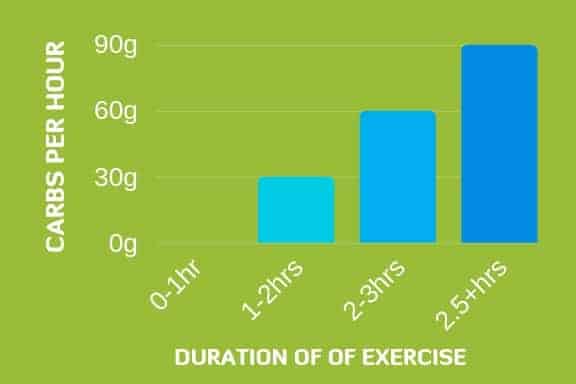Training for an endurance event? Your results on race day will rely on what you put in your mouth on a daily basis, just as much as your training workouts. There are so many new ideas, eating fads, diet experiments, and trusted old-fashioned approaches. How do you work out your own individualised sports nutrition strategy – the one that will reap results for you?
Let’s start with three important facts (not myths… or what your mate says is true on your group ride…)
Fact #1 Fatigue during prolonged exercise is usually due to muscle glycogen depletion and reduced blood glucose (basically running out of available energy) AND dehydration.
Fact #2 Your carbohydrate intake is the most important determinant of endurance performance. Basically, more carbs = better performance.
Fact #3 The intensity and duration of your exercise drives how much carbohydrate you need to absorb, not your body weight.
So, knowing these facts, there are some really neat ways to apply them to get the most out your performance. There are good reasons to watch what you eat and drink.
1. Your gut is trainable (this should be part of your training plan!)
You’ve heard your mates recount their ‘to hell and back’ tales of Ironman; the perfect, PB race which was derailed by by nausea, gut ache, and cramps. On the other hand, there was that one ‘stand out’ day when everything fell into place just right and they felt like Hercules as they crossed the finish line. What was the magic ingredient?
I know you can rely on me saying this; but SO MUCH of race day success depends on getting your nutrition right. Both on and before the day.
Did you know that you can teach your gut to tolerate higher loads of carbohydrate?
If you regularly consume carbohydrate or have a high daily carbohydrate intake, you may increase the ability of your gut to absorb carbohydrates. What does this actually mean? You will have more ‘available energy’ on race day, AND you can teach yourself to absorb and cope with more carbohydrate so that you don’t experience the unwanted side effects of nausea, vomiting or gut aches. And remember, your carb in take is the biggest determinant of your endurance performance.
The key here is to #keepfuelled during training, and remember you are not simply there to focus on your workout. Plan your nutrition for your big training rides, and don’t be impressed by the guy who comes back from a three hour ride bragging that he got through on one bottle of water and a gel. Pat him on the back with a grin now and be sure to give him a wave as you pass him on race day… 😉
2. Carbohydrate Guidelines – how much is enough?
The sports medicine guidelines are clear: no one size fits all. Your plan should be individualised, depending on the intensity and duration of the event. Having said that, we all need a starting point… so here are some general guidelines that you can use as a start when planning your training nutrition: (Tip: for 1 hour or less, you don’t need carbs; but as the duration increases so does your hourly carb requirements)

Your nutrition strategy on race day should rely on a practised and well-rehearsed food and fluid intake. By then, you should have trained your gut to take on board the fuel it needs to sustain your endurance activity.
Some #binditips on nutrition strategy:
Tip 1. Prepping before exercise:
Carbohydrate loading: this is loading your muscle glycogen stores leading up to race day is only required if your race is >90 minutes. There is little or no benefit when the exercise duration is less, and may even make you feel bloated and sluggish due to added water retention/glycogen storage (no thanks!)
If you have trouble drinking enough fluid during exercise, or you know it is going to be super hot, you might benefit from pre-hydration. Use a combination of water or liquid carbohydrates such as Bindi Natural Sports Hydration before exercise. Do be careful to get the balance right – too much fluid could result in needing a toilet stop!
Tip 2. What do I do after exercise?
This is the golden window where you can get a LOT right in terms of your nutrition. It is also when you are tired… so if you don’t plan ahead it is easy to make poor choices. What do you really need? Carbs AND protein within about 60 minutes of finishing your session. This will kick-start your recovery, set you up for better food choices throughout the day and help support your immune system. The end result is you will perform better at your next training session which is vital in multi-sport endurance training.
Tip 3. How much fluid do I need?
It is worth taking the time to weight yourself before and after a key training session to get an idea of how much fluid you are actually losing. It should be no more than 2-3% loss in a session lasting more than 90 minutes. This is where Bindi comes in: a sports drink will supply the energy you need, but the added benefit is that you will absorb (and retain) more water by using it due to the carb and sodium levels. We’ve done the science for you…. and looked at the perfect mix to make sure you absorb all the water and carbs you need.
Tip 5. Is more carbs or fluids better?
Overloading or hyper-concentrating your drinks with too much carbohydrate can compromise fluid delivery to your body, which can be dangerous. Just as dangerous is taking on too much water without enough salt – it’s a fast track to the medical tent with signs of confusion, weakness and fainting. Find the balance between maintaining hydration status and providing glucose to your working muscle, and if in doubt, stick to the label instructions!
Tip 6. I have a funny tummy… how do I avoid trouble?
Some people are simply more susceptible than others to gut distress during exercise, and research shows us that some people may simply have a genetic predisposition. Here are the big three things to avoid if you want to keep some dignity on race day:
Fibre: reduce your fibre intake in the few days leading into a race and most certainly on race morning.
Protein: beware the ‘all in one’ sports nutrition products that include protein (which we know is unnecessary during exercise) as they can be harder to digest during intense exercise.
Concentrated carbohydrate solutions: these are the ‘liquid only’ nutrition solutions that also promise to deliver all your carb needs in a concentrated solution. They are perfect for some, but a recipe for disaster for many athletes with sensitive tummies!
Our final tip: work hard in training and teach your gut to absorb carbs; this simply will bring your best results on race day and allow you to benefit from all your hours of hard work you’ve put into training.
Be ‘that’ athlete who just had ‘everything fall into place’ on the big day!!
Belinda x
References
- Brillat-Savarin A. 1826. Physiologie du Gout, ou Meditations de Gastronomie Transcendante. [The Physiology of Taste: A handbook of gastronomy].
- Jeukendrup A, 2011. Nutrition for endurance sports: Marathon, triathlon, and road cycling. Journal of Sports Sciences, 29 (Suppl 1): S91 – S99. Accessed March 2017 at: http://www.tandfonline.com/doi/full/10.1080/02640414.2011.610348
- Jeukendrup A, 2014. A step towards personalized sports nutrition: Carbohydrate intake during exercise. Sports Medicine, 44 (Suppl. 1): S52-S33. Accessed March 2017 at: https://www.ncbi.nlm.nih.gov/pmc/articles/PMC4008807/
- American College of Sports Medicine, Academy of Nutrition and Dietetics Dietitians of Canada. Special Communications: Joint Position Statement 2016. Nutrition and athletic performance. Medicine and Science in Sports and Exercise, 48 (3): 543-568. Accessed March 2017 at: http://ow.ly/x5wm30akdKq
- Burke, LM 2015. Re-examining high-fat diets for sports performance: Did we call the ‘nail in the coffin’ too soon? Sports Medicine, 45 (Suppl 1): S33 – S49. Accessed March 2017 at: https://www.ncbi.nlm.nih.gov/pubmed/26553488
- Beelan et al. 2010. Nutritional strategies to promote postexercise recovery. International Journal of Sport Nutrition and Exercise Metabolism, 20: 515-532. Accessed March 2017 at: https://www.ncbi.nlm.nih.gov/pubmed/21116024
